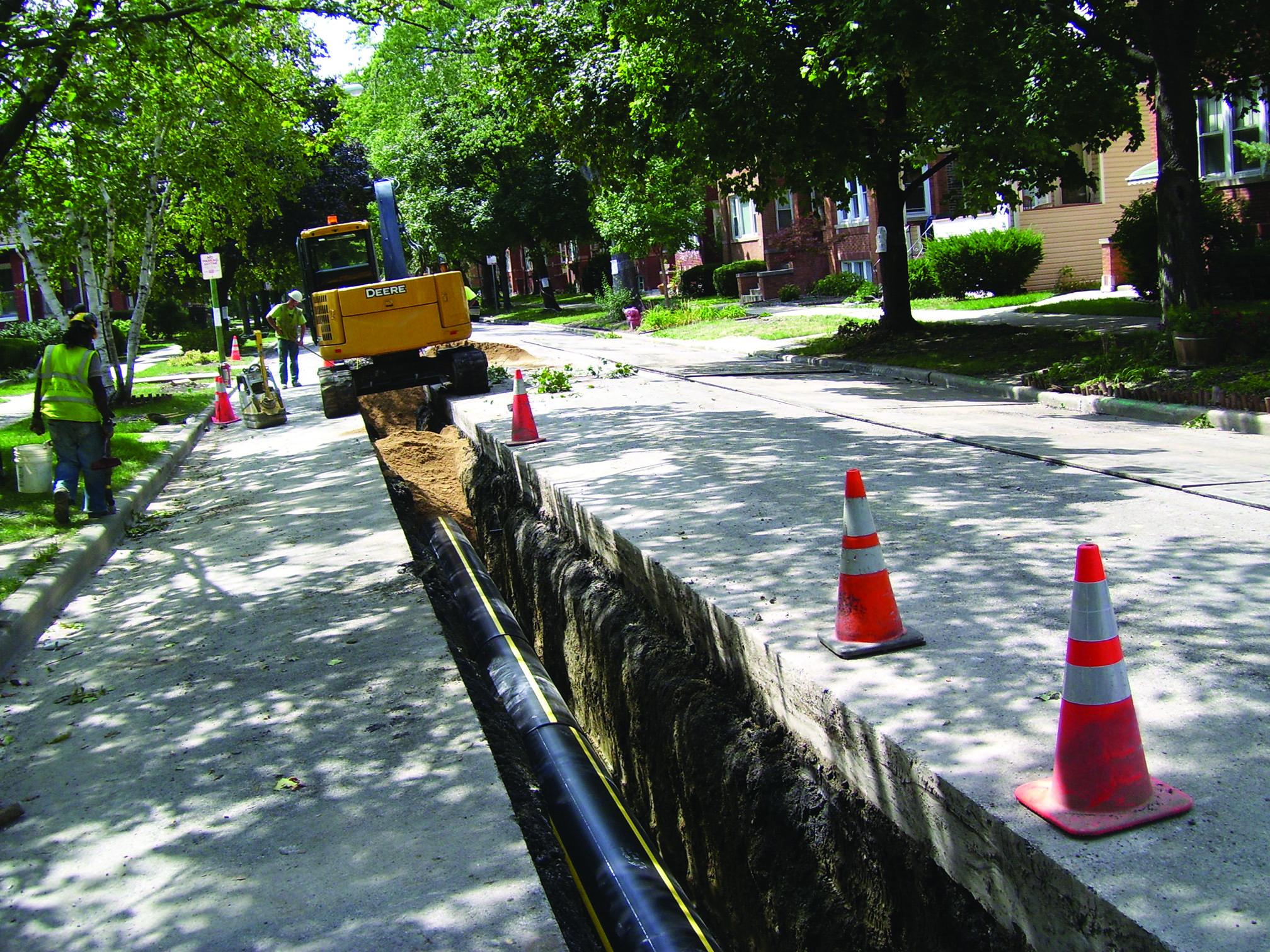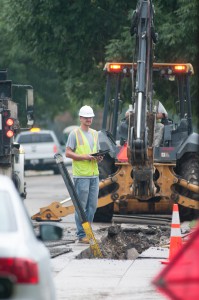October 2014, Vol. 241, No. 10
TechNotes
Outsourcing Key To Quick, Conscientious And Cost-Effective MR Programs

Several public utility commissions in the United States have approved programs allowing local gas distribution companies to recover the cost of replacing and repairing pipeline infrastructure. Now the rush is on to design and construct the resulting main replacement (MR) programs.
With limited resources and an urgent need to improve their pipeline safety, several local distribution companies (LDCs) are outsourcing some or all of their MR needs. Selecting the right team to perform outsourced services can lead to lower costs, accelerated ramp-up schedules and experts to manage program scale.
A Need for Speed
Design and execution of accelerated main replacement programs often require rapid deployment of resources. But few utilities have experienced personnel available to execute rapid deployment. The process of hiring and training staff can take months or even years. Utilities located in less populated regions may also find it difficult to compete for a limited number of qualified job applicants. Outsourcing an MR program can free up internal resources, eliminate the need to hire and train personnel, and keep payroll and benefits expenses in check.
Beyond the human resources delays, outsourcing can greatly reduce the design and development time of a main replacement program. Engineering and design contractors can commit to a short ramp-up time and can adjust to varying workload levels. With an outsourced team dedicated to main replacement, some LDCs also benefit from “on-the-shelf” main replacement designs for the future.
It is not uncommon for consulting teams to design MR projects for the subsequent year that are then put on the shelf. Permits are obtained when the projects are ready for construction. Occasionally “on-the-shelf” designs can offer LDCs the flexibility to allocate unused capital budget dollars to additional miles of MR when conditions are right.

Value Planning
There are other benefits to long-term planning which can easily translate into cost reductions. Coordinating MR projects with public works projects promotes better relations with public officials and can help reduce resurfacing costs, for example, by sharing those costs with public improvement projects. Municipalities appreciate advance notice regarding MR programs and are often willing to work with the LDCs to minimize project disruption and enhance coordination.
Choosing an outsourced partner experienced in preparing for, and meeting with, public works officials to discuss coordination, permitting, and restoration requirements can be beneficial. We often see MR programs ranging from 10-20 years and annual planned replacement footage between 50-100 miles. Coordinating the details associated with MR programs on this scale is more efficient and streamlined with outsourced teams completely focused on such details.
Selecting The Right Outsourced Partner
There are in excess of 100,000 miles of cast iron, bare steel, and older vintage plastic pipe in service, much of it in need of replacement. And there are countless LDCs – all with varying levels of MR needs, budgets, scope, and scale – ultimately responsible for the replacement of these mains and services. Choosing the best outsourced partner to meet specific needs requires some diligence. Here are several criteria to consider.
- Range of services. Depending on your internal resources, you may need some, or all, of your MR program outsourced. So consider what tasks you will need outsourced. Choose a firm that can perform the following: estimating, drafting services, execution and coordination planning, GIS implementation, mapping services, material list development, permitting services, replacement plan, and system design/modeling.
- Level of participation. While several firms can perform some aspects of MR services, fewer firms are able to provide all the key elements of an accelerated MR program. If your company desires to outsource the program development of your MR program, be sure your outsourced team is adept at this. Beyond just program development, a few firms will provide design, inspection, construction field support, and field documentation. We are finding that more of our customers are moving toward one inspector for each field crew. Your outsourced partner should have the resources to meet this need.
- Geographic reach. It may not be necessary for your outsourced partner to be located in your backyard. In fact, firms with a national service area are more likely to have faced similar local jurisdictional requirements or geographical challenges as those in your area. Selecting a firm with a national scope also ensures that personnel can be quickly assigned to your MR program regardless of location.
- Breadth of experience. Firms with an extensive resume of MR programs are more likely to recommend industry leading best practices, not just during the design and permitting process but from program development through to field inspections and documentation.
- Years of experience. Again, the more experience the outsourced firm has in designing and managing MR programs, the more value you will derive from their expertise. Every firm has to have its “first” main replacement program client. But you don’t want that client to be you.
- Access to new technology. Utilities have a range of technology at their fingertips. But not all distribution companies use the same platforms, systems, or procedures. Be sure to ask your outsourced partner upfront what systems their team is trained and experienced in using. You may want to ask specifically about work and asset management systems, real time as-built capabilities, GIS design, GPS documentation, and bar coding, for example. Select a firm whose skills and systems are compatible with your own.
- Remote capabilities. It may seem counterintuitive, but more clients are opting to have their main replacement programs designed remotely. This requires a more adept outsourced team with enhanced technological capabilities. In fact, we have found that some of our most cost-effective main replacement programs are those designed remotely.
- Remote access. Utilizing new technology enables the outsourced firm to access client, municipal, and other utility infrastructure information remotely and to reduce the need for onsite records retrieval. Water, sewer, telecom, and electric details and location information most often can be obtained remotely as well. LDC service record cards, GIS, maintenance records, and work management systems may also be accessible remotely which can lead to reduced design costs and travel expenses. In order to integrate an outsourced firm, you should take steps early to determine internal security requirements, protocols, etc. so that this capability does not delay your project ramp-up.
Eight Key Considerations When Selecting MR Program Outsourced Partner
1. Range of services
2. Level of participation
3. Geographic reach
4. Breadth of experience
5. Years of experience
6. Access to new technology
7. Remote capabilities
8. Remote access
Whether looking to reduce costs, accelerate ramp-up, avoid hiring and training, or create a more streamlined process, outsourcing MR program is a viable solution to these and many other challenges. Taking care to thoroughly review and select an outsourced partner will help secure a team of MR experts for your specific needs now and into the future.
Authors:
Les Goodman is vice president of EN Engineering, based in Glen Burnie, MD. He has more than 30 years of experience in natural gas engineering, operations, maintenance, and consulting. He can be reached at (443)577-3871 or lgoodman@enengineering.com.
Adam Biggam is vice president, distribution of EN Engineering, based in Warrenville, IL. He has more than 10 years of experience, specifically with natural gas accelerated main replacement programs. He can be reached at (630)353-4071 or abiggam@enengineering.com.
Michael Garvey is vice president, business development at EN Engineering, based in Warrenville, IL. He has more than 20 years of experience and a background in high pressure gas transmission pipeline operations. He can be reached at (630)353-4012 or mgarvey@engineering.com.





Comments